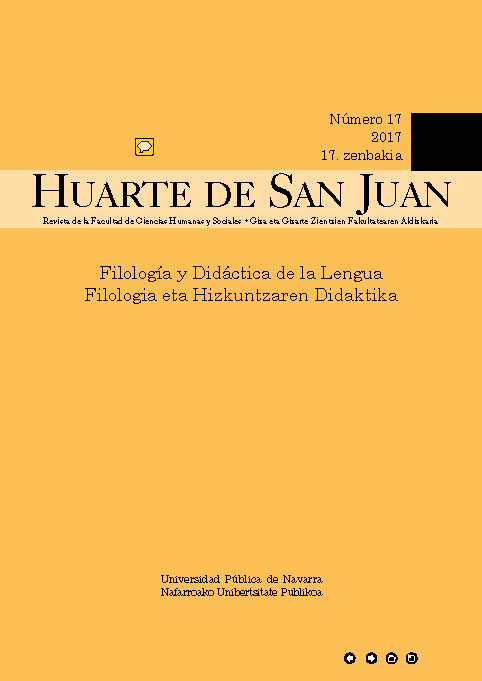Activation activities as a catalyst for increased rates of vocabulary and grammar learning
Keywords:
Activating, EFL, vocabulary, grammar, motivationAbstract
Accessing or activating prior knowledge seems to be essential when fostering meaningful learning. The current study explores the effects of activating prior language knowledge on vocabulary and grammar by comparing an experimental EFL secondary school group against a parallel control group. The treatment for the experimental group consisted on tailored vocabulary and grammar activating activities for ten sessions. With a pre-post-test design, data were collected from: (1) a pre-and a post-test to measure vocabulary and grammar; (2) a pre-and-post textbook unit test; (3) a satisfaction questionnaire after the experimental period. The various analyses confirmed the benefits of activating in EFL classes, as experimental learners produced more vocabulary items and scored higher in all the tests. The results for the grammatical activities, also pointed to the merits of activating for grammatical features. Furthermore, experimental learners showed a positive motivation towards the activating activities and expressed their willingness to continue with them
Downloads
References
Cambridge University Press (2010): Placement Test <http://www2.klett.de>.
Coyle, D. (2007): «Content and Language Integrated Learning: Towards a Connect-ed Research Agenda for CLIL pedagogies», The International Journal of Bilingual Education and Bilingualism, nº 10, pp. 543-562. Doi: https://doi.org/10.2167/beb459.0.
Cummins, J. (1984): Bilingualism and special education: Issues in assessment and pedago-gy. Clevedon, Multilingual Matters.
Dale, L. & Tanner, R. (2012): CLIL Activities – A resource for subject and language teachers, Cambridge, Cambridge University Press.
Dale, L., Van der Es, W. & Tanner, R. (2010): CLIL skills, Harlem, European Platform, Universidad de Leiden.
Dochy, F., Segers, M. & Buehl, M. M. (1999): «The relation between assessment practices and outcomes of studies: the case of research on prior knowledge», Review of Educational Research, nº 69 (2), pp. 145-186, <http://journals.sagepub.com/doi/pdf/10.3102/00346543069002145>.
Dole, J. A., Valencia, S. W., Greer, E. A. & Wardrop, J. L. (1991): «Effects of two types of prereading instruction on the comprehension of narrative and exposi-tory text», Reading Research Quarterly, nº 26 (2), pp. 142-159. Doi: http://dx.doi.org/10.2307/747979
Evans, V. & Dooley, J. (2010): Spark 2, Berkshire, Express Publishing.
Ferris, D. R. (2011): Treatment of Error in Second Language Student Writing, Michigan, University of Michigan Press.
García Mayo, M. P. & Villarreal, I. (2011): «The development of suppletive and affixal tense and agreement morphemes in the L3 English of Basque-Spanish bilinguals», Second Language Research, nº 27, pp. 129-149. Doi: 10.1177/0267658310386523
Graves, M. F., Cooke, C. L. & Laberge, M. J. (1983): «Effects of previewing difficult short stories on low ability junior high school students’ comprehension, recall, and attitudes», Reading Research Quarterly, n.º 18 (3), pp. 262-276. Doi: http://dx.doi.org/10.2307/747388
Langer, J. A. (1984): «Examining background knowledge and text comprehension», Reading Research Quarterly, nº 19(4), pp. 468-481. Doi: 10.2307/747918
Long, S. A., Winograd, P. N. & Bridget, C. A. (1989): «The effects of reader and text characteristics on imagery reported during and after reading», Reading Research Quarterly, nº 24(3), pp. 353-372. Doi: 10.2307/747774
Maghsoudi, N. (2012): «The Impact of Schema Activation on Reading Comprehen-sion of Cultural Texts Among Iranian EFL Learners», Canadian Social Science, nº 8(5), pp. 196-201, <http://www.cscanada.net/index.php/css/article/view/j.css.1923669720120805.3131>.
Majid Hayati, A. (2009): «The Impact of Cultural Knowledge on Listening Comprehension of EFL Learners», English Language Teaching, nº 2 (3), pp. 145-152. Doi: http://dx.doi.org/10.5539/elt.v2n3p144
Marsh, D. (2002): CLIL/EMILE – The European Dimension: Actions, Trends and Fore-sight Potential, Brussels, the European Union.
McKeown, M. G., Beck, I. L., Sinatra, G. M. & Loxterman, J. A. (1992): «The relative contribution of prior knowledge and coherent text to comprehension», Reading Research Quarterly, nº 27(1), pp. 78-93, <https://files.eric.ed.gov/fulltext/ED330991.pdf>.
Mehisto, P., Marsh, D. & Frigols, M. (2008): Uncovering CLIL: Content and Language Integrated Learning in Bilingual and Multilingual Education. Oxford, Macmillan.
Nakata, Y. (2006): Motivation and Experience in Foreign Language Learning. Oxford, Peter Lang.
Prieto, A. & Bueno, M. C. (2015): «The influence of socio-economic background, personal effort and motivation on English proficiency», Huarte de San Juan. Filología y Didáctica de la Lengua, nº 15, pp. 43-65, <http://academica-e.unavarra.es/handle/2454/20371>.
Roozkhon, M. & Rahmani Samani, E. (2013): «The Effect of Using Anticipation Guide Strategy on Iranian EFL Learners’ Comprehension of Culturally Un-familiar Texts», Mediterranean Journal of Social Sciences, nº 4(6), pp. 127-140. Doi: 10.5901/mjss.2013.v4n6p127
Shabani, M. (2013): «The Effect of Background Knowledge on Speaking Ability of Iranian EFL Learners», International SAMANM Journal of Marketing and Manage-ment», nº 1(1), pp. 25-33, <http://www.samanmjournals.org/wp-content/uploads/The-Effect-of-Background-Knowledge-on-Speaking-Ability-of-Iranian-EFL-Learners1.pdf>.
Shamla, K. (2010): The Effectiveness of a Suggested Program Based on Prior Knowledge to Develop Eighth Graders’ English Reading Comprehension Skills, The Islamic University of Gaza, <http://library.iugaza.edu.ps>.
Stevens, K. C. (1980): «The effect of background knowledge on the reading comprehension of ninth graders», Journal of Reading Behavior, nº 12(2), pp. 151-154. Doi: 10.1080/10862968009547365
Stevens, K. C. (1982): «Can we improve reading by teaching background infor-mation?», Journal of Reading, nº enero, pp. 326-329, <http://www.jstor.org/sta-ble/40030380>.
Strangman, N. & Hall, T. (2004): Background Knowledge: Curriculum Enhancement Report, Wakefield, NCAC, <http://aim.cast.org>.
Tobias, S. (1994): «Interest, prior knowledge, and learning», Review of Educational Research, nº 64(1), pp. 37-54. Doi: https://doi.org/10.3102/00346543064001037
Villarreal, I. (2011): Tense and Agreement in the Non-Native English of Basque-Spanish Bilinguals: Content and Language Integrated Learners vs. English as a School Subject Learners, Bilbao, Universidad del País Vasco. Doi: 10.13140/RG.2.2.25460.96644.
Zenotz, M. V. (2012): «Motivación en el aprendizaje de lenguas: estado de la cuestión», Huarte de San Juan. Filología y Didáctica de la Lengua, nº 12(1), pp. 75-81, <https://academica-e.unavarra.es/handle/2454/9359>.
Downloads
Published
How to Cite
Issue
Section
License
All articles are published under a Creative Commons (BY-NC-ND 4.0) license. Each article will be assigned a DOI.
Authors retain copyright of their work and grant the journal the right to the first publication. Authors can sign additional agreements to non-exclusive distribution of the published version of the article (for example, in an institutional repository) as long as appropriate attribution to the original publication is provided. Articles can be uploaded to institutional repositories immediately after publication.
Electronic distribution of the articles (for example, academic social networks or personal webpages) is allowed and encouraged.
The journal reserves the right to publicise the work in social networks and other electronic means.







